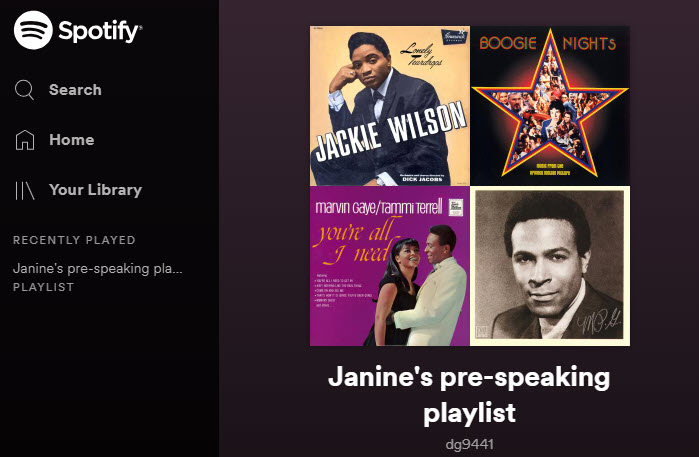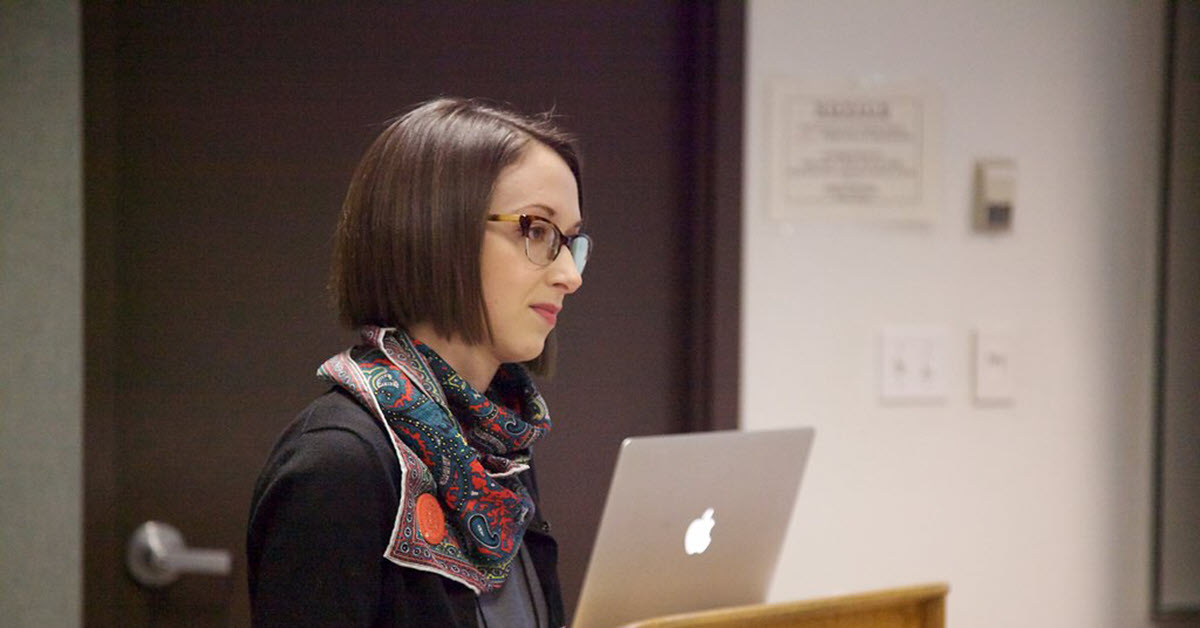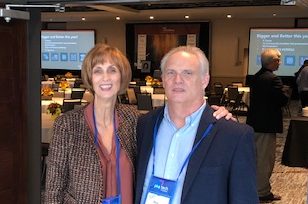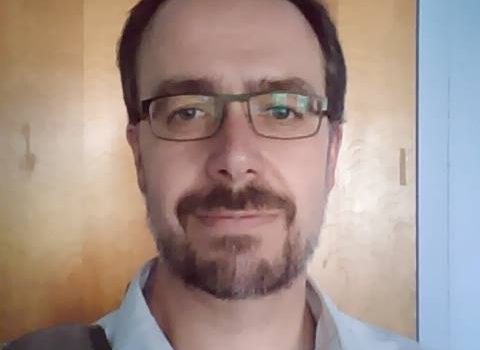
Episode 011: Janine Rowe–Introvert Role Models
Category:Higher Education,introversion,Introverted Leadership,introverts,personality,PodcastPodcast: Play in new window | Download
Subscribe: Spotify | Amazon Music | iHeartRadio | Podchaser | TuneIn | Deezer | RSS
Episode 011 Show Notes: Janine Rowe
Introduction

Key concepts
- Influencing and leading
- Classroom superlatives
- Role models
Quotable
I remember so clearly–the day that I found out my Myers Briggs type and how validated I felt, how I felt heard and understood, and I felt that I wasn’t alone. So I think the first recommendation I have for my fellow introverts is if you haven’t experienced the Myers Briggs Type Indicator or the Keirsey Temperament Assessments, is to do a complete assessment and really explore how those aspects of your personality are working together and what unique advantages you might have. It has been such a gift for me, just in embracing rather than working against myself.
(Speaking about Matilda) So talk about introvert power! She’s showing us that even though people may not understand, because you’re not outwardly expressing yourself or telling them what it is that’s important to you or what your goals are. She’s able to just work on herself and really her skill.
How painful it can be if you are called out in a public way for your quietness, for your introversion, or for your shyness, as painful, because you’re at the center of attention, which, if you’re an introvert, you probably don’t like that anyway.
It’s not that we don’t like people and extroverts are the ones that like people, that’s just where our energy comes from, especially as it’s related to that interaction.
One of the things that I’ve had to practice doing,…is I’ve learned to verbalize more. For example, I’m really excited about this event or about this project and just putting it out there for people is not my typical nature to do that, but I found that it’s really important for my colleagues who do tend to be more extroverted. They really rely on that verbal feedback,
Resources or Products Mentioned in this Episode
- Society for Technical Communication
- Rochester Institute of Technology
- New York State Career Development Association (NYSCDA)
- Kappa Kappa Psi
- Tau Beta Sigma
- Matilda (Roald Dahl)
- Eighth Grade (Bo Burnham)
Links
- Follow Hope for the Introvert on Twitter
- Like my page on Facebook
- Support me on Patreon
- Get swag for Hope for the Introvert and Introverted Leadership at Zazzle
Transcript
Ben: Welcome back Janine. Looking forward to another great conversation today. Let’s talk about the ways that you’ve been an influencer or leader. What are the active steps that you’re taking in that? Is it something that you’ve recognized that you want to be or something that’s been thrust upon you? How would you describe your role or pursuit or non pursuit of being an influencer or a leader?
Janine: Yeah, certainly that’s something I’ve been working on over the past recent years. I’m currently finishing up a term as vice president of the New York State Career Development Association, which is our state affiliate to the national association, and I’m president for these upcoming two years. So that’s a big test for me. But I have really good support in my most immediate past president. I’ve also found out–I realized that I’ve been seeking out some leadership opportunities within professional associations that are by their nature, small committees that may work really deeply and significantly on a specific issue. A lot of people gave me advice, “Well, just run for the board,” or you know, “Just go up for a position,” and I hope to do that someday. But in the meantime, I’ve been a part of a counselor education academy and a leadership academy, which are both small groups that meet regularly over the course of two years to advance a specific advocacy project within the association.
Janine: That’s really been perfect for me because it’s a small group of about 10 people. And we can have an audience to give our findings to the board. Another thing that’s been helpful is seeking out leadership in spaces where there’s a lot of other introverts in the group. So within something like a national career development association, a lot of us are introverts and counselors there. So I feel that it’s really–it’s home–and there people don’t mind if you sit out of sessions and things like that because I think they understand how overwhelming the convention can be.
Ben: What recommendations do you have for introverts who want to become influencers or leaders?
Janine: When I think of this question, I think–I remember so clearly–the day that I found out my Myers Briggs type and how validated I felt, how I felt heard and understood, and I felt that I wasn’t alone. So I think the first recommendation I have for my fellow introverts is if you haven’t experienced the Myers Briggs Type Indicator or the Keirsey Temperament Assessments, is to do a complete assessment and really explore how those aspects of your personality are working together and what unique advantages you might have. It has been such a gift for me, just in embracing rather than working against myself. Other than that, I think there has been some element of “fake it ’til you make it” and just trying different things out in terms of speaking up in meetings or going out to do a presentation or professional development training, because for me, the more I have put myself out of my comfort zone, the more I do–the more I can do in the future. So even though I’m not always 100 percent comfortable in those settings, it does help me to develop those skills and be more comfortable now.
[bctt tweet=”A recommendation I have for my fellow introverts is if you haven’t experienced the Myers Briggs Type Indicator or the Keirsey Temperament Assessments, is to do a complete assessment and really explore how those aspects of your personality are working together and what unique advantages you might have. @JanineMRowe” username=”hopeintrovert”]
Ben: Stretching yourself or kind of pushing yourself beyond what you’re comfortable with has been a recurring theme in the conversations that I’ve had in previous podcasts as well. So I think for our listeners, I would really embrace that, because we don’t change unless we do something different. And I’ve looked at every step I’ve taken on my leadership journey and many, many times I’ve taken a big gulp and then stepped forward into it, worried or afraid of what the results might be. But overall it’s worked well for me. So I think that’s a really interesting point as well.
[bctt tweet=”We don’t change unless we do something different. And I’ve looked at every step I’ve taken on my leadership journey and many, many times I’ve taken a big gulp and then stepped forward into it, worried or afraid of what the results might be. But overall it’s worked well for me. @benwoelk” username=”hopeintrovert”]
Ben: One of the things that Janine and I have talked about is the idea of appropriate role models for introverts. And I think this is really important in our Western society, given that the ideal is an extrovert leader and that’s who many of the business schools train people to be. And even though we’re probably close to a 50/50 split in the population between extroverts and introverts, I think most of the studies have shown it’s extroverts who tend to have the higher positions in companies, even though there doesn’t seem to be any real evidence that they’re going to be any more effective doing this. So what do you think about this idea of introvert role models. And the other way you phrased it was, classroom superlatives?
Janine: Definitely. I think we really need to be on the lookout for individuals who are influential or powerful or who we just admire for the quality of their work who are introverts. Because I do think that sometimes extroverts can be better at promoting themselves and letting others know all of what they’re capable of and all of their accomplishments. A nd I’ve also noticed that introverts–especially maybe in TV or movies–they can be associated as lacking in social skills or that the introversion is a negative aspect of their personality and something that they need to work through. And so I think we should pay attention to those examples where the introversion is a kind of a key aspect of an individual’s success.
Ben: I think given our society that we are often presented with introversion being a handicap or a handicap towards leadership of some kind. And as I’ve learned more about my temperament type (which is INTJ), I found that I learned more about what I can do as an introvert. And I’m not really seeing it as a detriment at this point at all. It’s really more, these are the strengths I bring as an introvert. And that informs my approach to leadership, because I can build on the strengths and stay–not stay away completely–but try to avoid some of the things that are not going to work well for me. Well–and I think this works for all of us–we each kind of learn our own path and what works for us and what things don’t work as well. Now you had mentioned role models and I’m struggling a little bit with this as well, trying to figure out who are our introvert role models, because much of what we do see on TV or in media in general does seem to be people who have very, very poor social skills. Do you have any thoughts about who would serve as a role model? Maybe if not real life people at this point, what about fictional characters?
Janine: The first thing that comes into my mind would be Matilda in the Roald Dahl book and the movie. Matilda definitely is an introvert role model. I actually identify a lot with her because as a young child, she spent a great deal of time on her own and she loved reading, and she was because of this, really misunderstood by her family, and they just saw that as a negative trait and she was really an outcast from her own immediate family unit. And another way we know she’s an introvert is because she was so choosy and particular with who she would become close friends with. And that was primarily her teacher. And she had one friend whose name was Lavender. And throughout the book, her introversion is really her power, because she’s discovering that through really intense conversation and through practice.
Janine: And she always practiced alone, which I think is a really, to me, a very important aspect of introversion is we don’t like to practice new skills in front of other people. Neither did she. So she learned that through concentration she was able to manipulate objects in the environment just with her eyes. And so she gets really good at doing this and she becomes the hero, because she uses this power to exact some revenge on the villain in the story, which is her horrible, awful principal at the school. So talk about introvert power! She’s showing us that even though people may not understand, because you’re not outwardly expressing yourself or telling them what it is that’s important to you or what your goals are. She’s able to just work on it herself and really her skill. It’s a very lovely book and movie, so I recommend it.
Ben: Yeah. it sounds like a really good role model for an introvert. It’s trying to think in terms of introverts in say, in real life, I don’t really like to term and who the better known introverts are in initially. Of course I was drawing a total blank with that, so I Googled it and pulled up a list. So for our listeners, some of the well-known introverts in history, (those are the ones that have been regarded as most successful) include Albert Einstein, Rosa Parks, Bill Gates, Steven Spielberg, Sir Isaac Newton, (who I’m sure did not take a Meyer Briggs), Eleanor Roosevelt, Mark Zuckerberg, Larry Page, and the list goes on and on. And Abraham Lincoln, JK Rowling, Warren Buffet, Gandhi, you know, very, very well known names. So we do have people that we can look at as role models who have been very successful as introverts and of course they work in different ways than the extroverts that we would see in the world around us.
Ben: Janine, what else could you share that would be helpful to our listeners?
Janine: I had the most intense and just unexpected reaction to a movie which is out now. And I recommend that listeners go and check it out because I think us introverts will find a lot to identify with. The movie’s called Eighth Grade, and in it, there’s a main character who is an eighth grader–a young woman and she really–not just as an introvert–she really suffers with social anxiety, and there’s a scene early on when they’re handing out Classroom Superlatives for the Yearbook. And so these are things like Most Likely to Succeed or Best Eyes that her classmates are winning and they’re so happy to be doing so. And then she wins for Most Quiet. So she’s recognized as the most quiet person in her school and she’s just mortified by this. And I couldn’t believe it because when I was in high school, I was voted Most Likely to Come to School and Leave Without Talking to Anyone.
Janine: And–and I was so embarrassed to receive that so-called recognition award. It was painful to be called out publicly for being quiet, when I did not consider that to be a detriment or a flaw at all. That was just where I was most comfortable. And it was true that sometimes I would go into a room and leave and not talk to anyone, so I was so pleased to see validation of that experience, even though it was fictional, to show how painful it can be if you are called out in a public way for your quietness, for your introversion, or for your shyness, as painful, because you’re at the center of attention, which, if you’re an introvert, you probably don’t like that anyway. And also because it’s really a mischaracterization of our experience. In the movie she is shy, but she has definitely a social appetite and a want to connect with friends.
[bctt tweet=”How painful it can be if you are called out in a public way for your quietness, for your introversion, or for your shyness, as painful, because you’re at the center of attention, which, if you’re an introvert, you probably don’t like that anyway. @janinemrowe” username=”hopeintrovert”]
Ben: Most of our listeners right now are saying, “What’s the problem with being quiet again?” But I know high school, junior high and high school, it’s like everything that could possibly be different or unique is just called out at some point. It’s like if you don’t fit the mold of whatever that ideal is, somebody draws attention to it.
Janine: Exactly.
Ben: So one thing that’s interesting, you talked about introverts not wanting to be the center of attention. I know for me personally that there have been a couple of times where I’ve received public recognition for things unexpectedly and my mind has just gone blank at the time, because I think there’s such cognitive dissonance that I’m just not prepared to deal with it. And I’ve mutely gone up and accepted whatever that recognition or award is, but I have not had a clue as far as what should I say, should I say anything? So it’s–it’s interesting. But that whole being unexpectedly put on the spot, at times I found that, I don’t know if I could say I’ve found it terrifying, but it’s definitely been really uncomfortable.
Janine: It’s definitely an uncomfortable experience. And then if you’re anything like me, which I think you are, you spend a lot of the remainder of the day and the next day thinking about how you could have handled that differently.
Ben: Now, I’m going to think about the one time however many years ago and why, why couldn’t I have been more socially apt and been able to handle that better?
Janine: What was the situation?
Ben: That situation was–actually, it was college and I was part of a band service fraternity called Kappa Kappa Psi, and we had a sister organization called Tau Beta Sigma. The chapter was Beta Xi, and they had an award each year for their Beta Xi Guy, who had been helpful to them through the year for their organization. And I was at a picnic where they were giving out these recognition awards and they announced my name for it, and I just sat there. I didn’t have anything to say. I had no response and I hope they understood. I was appreciative of being recognized for the–for that award, but I just wasn’t prepared to say a thing. Now, if I’m going into something and I have some idea, hey, you’re going to be recognized for something or attention is going to be placed on you for some reason, it’s a little bit different because I can get ready for it psychologically, but otherwise no, I just totally draw a blank with it.
Janine: I can understand that. Yeah. Being prepared with a heads up is definitely a key and I’m quite sure I could not have conjured up a different response than you did in that situation.
Ben: No. What ended up–and this is probably going to be no surprise to our introverted listeners. When Janine and I get together we can talk about pretty much anything because we’re comfortable with each other, because over time we’ve been able to build that relationship. So it is interesting that the public view of what an introvert is like doesn’t necessarily meet that inward reality at all.
Janine: Absolutely. I think that’s key. And we both do have a social appetite, so we’re introverts who are quite motivated by forming relationships as well. And I want more people to understand that about introverts. It’s not that we don’t like people and extroverts are the ones that like people, that’s just where our energy comes from, especially as it’s related to that interaction.
[bctt tweet=”It’s not that introverts don’t like people and extroverts are the ones that like people, that’s just where our energy comes from, especially as it’s related to that interaction. @janinemrowe” username=”hopeintrovert”]
Ben: Any additional thoughts that you think would be helpful to our listeners?
Janine: I have realized early on in my career as a counselor that I sometimes come off as aloof or uninterested in my colleagues, and I really don’t want that because that’s not true. It may just be I’m oriented not to make small talk and those types of things. And so that was creating kind of a misunderstanding or mischaracterization of how I was really feeling. So one of the things that I’ve had to practice doing that may help our listeners is I’ve learned to verbalize more. For example, “I’m really excited about this event or about this project”, and just putting it out there for people is not my typical nature to do that, but I found that it’s really important for my colleagues who do tend to be more extroverted. They really rely on that verbal feedback from their colleagues so I try to provide that for them.
Ben: I think that’s a great way to wrap up the program. Thank you, Janine, for agreeing to be on the podcast with me and we look forward to you joining us a guest again in the future.
Janine: Thank you. I enjoyed talking with you.
Extras
STC Lightning Talks from STC Rochester on Vimeo.








 Prof. Kirk St. Amant and Ben Woelk discuss what it’s like to be an introvert in the classroom, how we engage students, and the role of popular culture in teaching. We also discuss how we adapt to the absence of in-person feedback mechanisms in webinars and online courses.
Prof. Kirk St. Amant and Ben Woelk discuss what it’s like to be an introvert in the classroom, how we engage students, and the role of popular culture in teaching. We also discuss how we adapt to the absence of in-person feedback mechanisms in webinars and online courses.






